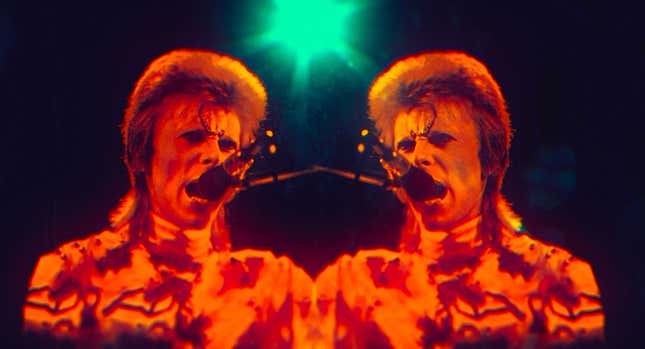
Moonage Daydream is a documentary about David Bowie that does all it can to avoid being a typical documentary—and it succeeds. It isn’t a cradle-to-grave investigation of the performer’s life, even though most of it follows chronological order. It isn’t a concert film, even though there is a lot footage of him on stage. All facts about the man come straight from the horse’s mouth, via old clips, yet half of them contradict one another. Still, you come away feeling that you saw a side of this beloved artist you never knew about before. It’s quite a feat.
The unusual approach creates more of “a David Bowie experience” than a movie which, for many fans (and possibly some noobs), is much more valuable than another look at some famous guy being unhappy at school, signing a deal, writing some songs, defying gender standards—all the boilerplate biopic stuff. Gen X-ers may recall lining up to see rock laser shows at planetariums when they couldn’t score tickets (or get parental permission) to go to a concert. When Moonage Daydream opens in IMAX screens, it’ll bring a little of that not-quite-there-but-still-somewhere magic back.
Though the film doesn’t just rely on the art of montage, it is essentially one long montage. More accurately, a collage. This could easily get annoying real fast, but director Brett Morgen has a true handle on the material. And an artist as mercurial as Bowie deserves (nay, demands!) unorthodox treatment. Talking heads with lower thirds, even in the Space Oddity font, just won’t do.
Splattered across the screen is great concert material (thanks D.A. Pennebaker, David Mallet, and everyone in between) and old interview footage (some of it from cool West German television, some from The Dick Cavett Show). Images are pulled from anywhere Bowie appeared before a camera, so that means fashion shoots, promotional material, and also movies like The Man Who Fell To Earth, Nicolas Roeg’s classic sci-fi cavalcade that dovetailed nicely with Bowie’s “Thin White Duke” period, as well as oddities like Nagisa Ōshima’s Merry Christmas, Mr. Lawrence.
This leads to a central issue with Moonage Daydream, which is, depending on your point of view, either a gutsy move or a failure. Someone who buys a ticket with a familiarity level of “yeah, ‘Modern Love,’ ‘Rebel, Rebel,’ and, uh, ‘Life on Mars?’ That’s David Bowie, right?” will be pretty baffled by this film. To use the Mr. Lawrence example, they might wonder why the hell this rock star keeps showing up in a Japanese prisoner of war camp.
Morgen’s steadfastness in refusing to offer context for some (most!) of these visual counterpoints is, in this critic’s opinion, a panacea against boring documentaries. It goes further, with spasmodic trips through associative images. An old interview of Bowie talking about the art of performance (offering details of the Ziggy Stardust persona) inserts clips from Metropolis, Mickey Mouse, Buster Keaton, cheesy ’50s sci fi, and actual images from outer space into the blender. It’s great because it’s set to those cool Mick Ronson guitar licks, and always finds a groove. But audiences looking for a little more clarity might think, “What the hell am I looking at?”
Themes emerge. Bowie can never sit still, he must always be reinventing himself. So after the smashing interplanetary success of The Rise And Fall of Ziggy Stardust And The Spiders From Mars (and its music hall-adjacent songwriting style), there are decadent years spent in Los Angeles. (Watch young, beautiful Bowie drink 2% milk direct from the carton!) Then there’s the retreat to Berlin to strip rock n’ roll to its subatomic particles with the Low, “Heroes,” and Lodger albums. But then, the man who says he only wants to make hyper-intellectual art, decides he wants to make the world a happy, poppy place, and records Let’s Dance. And then, once more, he says anyone too popular (and too wealthy) must be doing something wrong, and scurries back to more esoteric territory.
The cycle continues over and over, and Morgen lets you try and figure out Bowie’s psychology on your own. With the exception of a quick shout-out to Brian Eno, not one of Bowie’s collaborators gets a name-check. Not Tony Visconti, not Carlos Alomar, not Hunt and Tony Sales! (Indeed, no mention of Tin Machine at all!) With a career this vast, lots gets left out (Black Tie White Noise, you were a ’90s highlight for many, even if Morgen dissed you!). But there’s still buried treasure here, specifically, lots of Bowie’s paintings and sculptures. (There’s some of his ’70s “video art” which doesn’t come across so well on screen, but points for trying new innovations.)
If there’s a message at all in Moonage Daydream, it is secondary to the experiential nature of the movie. That’s hardly a knock. One goes to a concert to be thrilled, not necessarily to gather life lessons. Leave that sort of thing for the other, lesser documentaries.